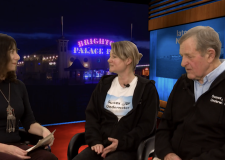Hotel approved on former Brighton ice rink site
A hotel is to be built in Brighton on the site of a former ice rink.
Plans for the Light Brighton Apart Hotel in Queen Square were approved at a meeting of Brighton and Hove City Council Planning Committee at Hove Town Hall yesterday (Wednesday 27 June).
The 12-strong committee initially voted to reject the plans but could not agree the reasons for their decision. The law requires planners to give reasons for a refusal.
So they voted again and agreed that the scheme should go ahead despite the concerns and objections of neighbours.
The scheme involves demolishing the old ice rink, close to the Clock Tower in Brighton, and building a five-storey hotel containing 56 serviced apartments. The derelict ice rink has been disused for nine years.
Councillors had concerns about the impact of the proposed hotel on two neighbouring conservation areas and nearby historic buildings because of its height.
Those buildings include the 14th-century St Nicholas Church and the grade II listed Wykeham Terrace, which was built in the 1820s.
When the committee first voted, five councillors supported the plans and five opposed them. Two abstained.
The chairman, Councillor Christopher Hawtree, used his casting vote to turn down the scheme.
After members were unable agree their reasons for refusal, they were given legal advice to hold another vote.
When they voted again, seven members backed the plans and five opposed them, including Councillor Hawtree.
He said: “My vote was consistent on each occasion, supporting refusal. Two councillors changed their minds.
“It was a painful decision, trying to balance what the city might gain against what it might lose in terms of the tranquillity of the nearby churchyard and views from that magical spot.”
The developer has agreed to employ local people for at least 20 per cent of the construction jobs and to pay £31,000 towards the cost of local training and employment schemes.
The developer will also fund “sustainable transport improvements” in Queen Square worth £22,000 and contribute almost £25,000 for public art.





















